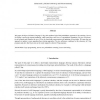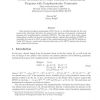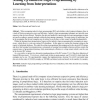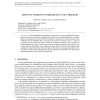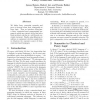2084 search results - page 101 / 417 » Set Constraints in Logic Programming |
129
click to vote
LPNMR
2004
Springer
15 years 8 months ago
2004
Springer
This paper develops a declarative language, P-log, that combines logical and probabilistic arguments in its reasoning. Answer Set Prolog is used as the logical foundation, while c...
122
Voted
MP
2002
15 years 2 months ago
2002
Using standard nonlinear programming (NLP) theory, we establish formulas for first and second order directional derivatives for optimal value functions of parametric mathematical ...
130
click to vote
CORR
2000
Springer
15 years 2 months ago
2000
Springer
When comparing inductive logic programming (ILP) and attribute-value learning techniques, there is a trade-off between expressive power and efficiency. Inductive logic programming ...
139
click to vote
ICLP
2010
Springer
15 years 6 months ago
2010
Springer
ABSTRACT. Action-probabilistic logic programs (ap-programs) are a class of probabilistic logic programs that have been extensively used during the last few years for modeling behav...
102
Voted
AAAI
1992
15 years 4 months ago
1992
We define fuzzy constraint networks and prove a theorem about their relationship to fuzzy logic. Then we introduce Khayyam, a fuzzy constraint-based programming language in which ...
